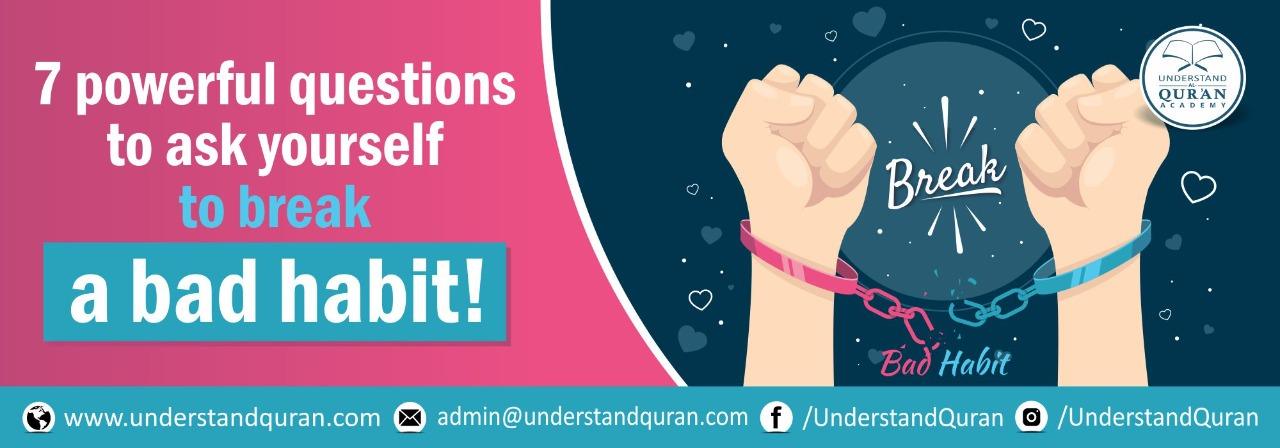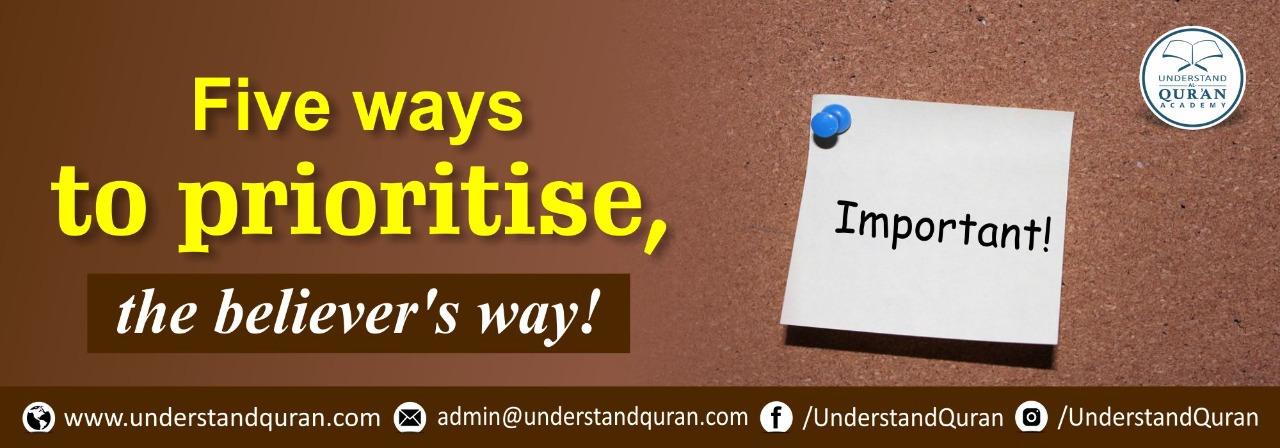7 powerful questions to ask yourself to break a bad habit!

There’s a beautiful, thought-provoking question of the Lord of the Worlds Himself addressed to you in His Book:
يٰۤاَيُّهَا الْاِنْسَانُ مَا غَرَّكَ بِرَبِّكَ الْكَرِيْمِ
O man! What has deceived you about your generous Lord? [Qur’an, 82:6]
What has ‘estranged’ you from your Generous, Kind, Merciful Lord? Ask yourself: What’s the main thing standing in the way in my relationship with Allah, the Most High?
For some it is a habit of swearing, or others it might be shouting at the children, or a habit of gossiping you keep on falling in to. For some it might be all of above. However, pick just one of them, the one you strongest feel is in the way of you feeling close to Allah. Then ask Allah, the Most High, from the bottom of your heart to help you battle this particular ‘obstacle’ in your relationship with Him and turn it to an opportunity to bring you closer to Him.
Next, discover seven questions to ask yourself now that will help you to break a (bad) habit, by Allah’s will.
1. Why do I want to change this habit?
It’s easier to change your behaviour when this change is beneficial to you, in this life and the next. Say to yourself: “I’m breaking this habit for the sake of Allah” and let this empower you.
Make a list with at least five benefits you’d see when you’d break this habit and hang it up near the place you might be engaged in this habit the most.
For example; if you have a habit of shouting, you could write:
– I will get rewarded for suppressing my anger.
– I will not hurt my own body with the stress that comes with shouting.
– I will not hurt others and push them away.
– I will set a good example for my family.
When you slip up, this list will remind you what you are striving for, by Allah’s will.
2. What are my triggers?
Triggers are the start of developing a habit and to remove these triggers, you first need to know what they are for you.
At least for two days track your habit and check:
– Where or when does this habit happen?
– Are others involved?
– Is the habit connected to any specific event before or after it?
For example, you want to stop backbiting and you realize after two days that you tend to discuss other people’s matters specifically in the weekend, when you visit relatives and you sit down to have tea after dinner. Instead of sitting down, plan in something to do as a family at tea time. Have a family game ready, or instead busy yourself playing with any children around.
3. Which friend can help me?
Choose a friend or relative to support you by telling him/her you are trying to break a certain habit and to remind you of your reasons to stop when you need it.
Or find someone who wants to break the same habit and be accountability partners. At the same time, learn how to say no to people if they are involved in your (bad) habit and may be a trigger.
4. Where can I stick reminders?
Next to the reasons of why you want to change this habit, it’s important to be reminded of the actual habit you’re trying to break as much as possible during your day as habits mostly happen on auto-pilot. Stick reminders on the wall all around the house, in the car, at your workplace, on the fridge. You can also use your smart device by setting alarms with a motivational line throughout the day; for example: ‘Not talking about others feels so good!’, ‘Praying on time feels so rewarding,’ or ‘Not shouting makes me feel so calm!’.
Also think if you can actively replace this habit with something else. For example, someone once developed the ‘Orange Rhino’ family challenge. As soon as one was about to shout, instead they’d say ‘Orange Rhino!’ and if they didn’t others in the house would remind them. They’d also print off orange rhinos and stick them on the walls as visual reminders. You can choose your own ‘Orange Rhino’ challenge and substitute or divert your bad habit to something else.
5. Do I think it is all or nothing?
Be prepared that you will slip-up and try to not let it get you down. A habit took a long time to form and it takes time to break. When you slip up, Shaytan will happily make you feel demotivated and think, “See, I knew I couldn’t do it!” or “What’s the point?”. Seek refuge from Shaytan and instead of focusing on where or when you went wrong, focus on what went right. You managed not to shout for three days and then slipped up the fourth day? Say Alhamdulillah you at least didn’t shout for those three days and Astaghfirullah for the day you did. It’s important to praise Allah, the Most High, and celebrate your successes once in a while rather than listening to Shaytan and let your guilt prevent you on your journey of breaking that habit. You can get yourself a treat or gift after breaking your habit for a certain amount of time.
6. Can I visualize myself breaking this habit?
Imagine you are in your triggering situation and how you would usually react and then visualize yourself breaking your habit by (re)acting differently. If you see things in your mind, it gets your brains more familiar with the desired situation so you are more prepared for when the situation or trigger happens in reality.
7. Can I give myself time?
You’ve asked Allah, the Most High, to help you break this habit over and over again but you still didn’t manage? Learn how to give yourself time. You might have seen research stating it takes 21 days to break a habit, but there are many results of research stating it may take months or even longer.
The Prophet ﷺ said: “There is no Muslim who calls upon Allah, without sin or cutting family ties, but that Allah will give him one of three answers: He will quickly fulfil his supplication, He will store it for him in the Hereafter, or He will divert an evil from him similar to it.” They said, “In that case we will ask for more.” The Prophet said, “Allah has even more.” [Ahmad]
Finally, have trust in and rely on Allah – Tawakkul – and know that you don’t have to be enough as long as you stay close to the One who is enough.
Praying you will benefit,
Hundreds of thousands of Muslims have benefitted from our short courses in Arabic and unique methodology. So, can you!
Apply here for a FREE TRIAL now.
Khawlah b. Yahya – United Kingdom
Khawlah b. Yahya founded SISTERS’ PROJECT in 2008, a United Kingdom based women’s support organization, the creative community lead in an art gallery and is a writer for different Islamic organizations and academies. She authored the renown How to Live by the Names of Allah Series, published by the Understand Qur’an Academy, as well as the internationally shared Revive a Sunnah Series. She focuses most of her work on how to translate classic Islamic Knowledge to daily life action. She recently released Personal Lessons from the Qur’an, in which daily life action points are based on Qur’anic Ayaat in a way that’s never seen before. You can purchase the E-book on: understandquran.com////////////////////////product/personal-lessons-from-the-quran/










